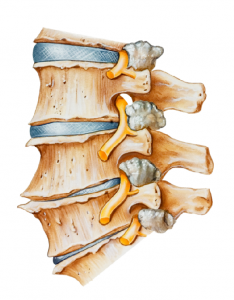You are able to move freely without causing severe impact injuries to your spine because of the spongy, shock-absorbing discs that separate each of the spinal vertebrae. These discs are unlike the bone they support because they are soft, gel-filled, and flexible.  Degenerative disc disease is a common term associated with back pain, as it describes a condition in which the intervertebral discs are compressed and dehydrated. The condition is not actually a disease, and it is seen in most aging adults.
Degenerative disc disease is a common term associated with back pain, as it describes a condition in which the intervertebral discs are compressed and dehydrated. The condition is not actually a disease, and it is seen in most aging adults.
Understanding changes to the disc anatomy
When you get older, your soft tissues lose their ability to retain water, so they begin to dry out. As this happens in the spinal discs, they become flattened under the weight of the spine. The space between the vertebrae gets smaller, and the spine becomes unstable. In the most advanced stages of degenerative disc, a disc may become so compressed that two vertebrae are actually grinding against each other. Complications can arise at an earlier point in degeneration as well; a compressed disc can protrude outward and put pressure on nearby nerve roots in a condition called herniated disc. You could also experience pain due to a tear in the outer membrane of the disc, which would cause the viscous liquid inside to spill out.
Preventing and treating degenerative disc
To a degree, degenerative disc is unavoidable because of the aging process. However, you can work to strengthen the muscles that support your spine so pressure is relieved from the discs. If you are already suffering pain related to degenerative disc, your doctor can prescribe pain medication that will help you get through physical therapy and chiropractic adjustments to re-stabilize the spine.
Learn more about reversing the damage of degenerative disc disease with the specialists at Non-Surgical Orthopaedics, P.C. in Georgia. Schedule a consultation with us by visiting our website or calling 770-421-1420.
